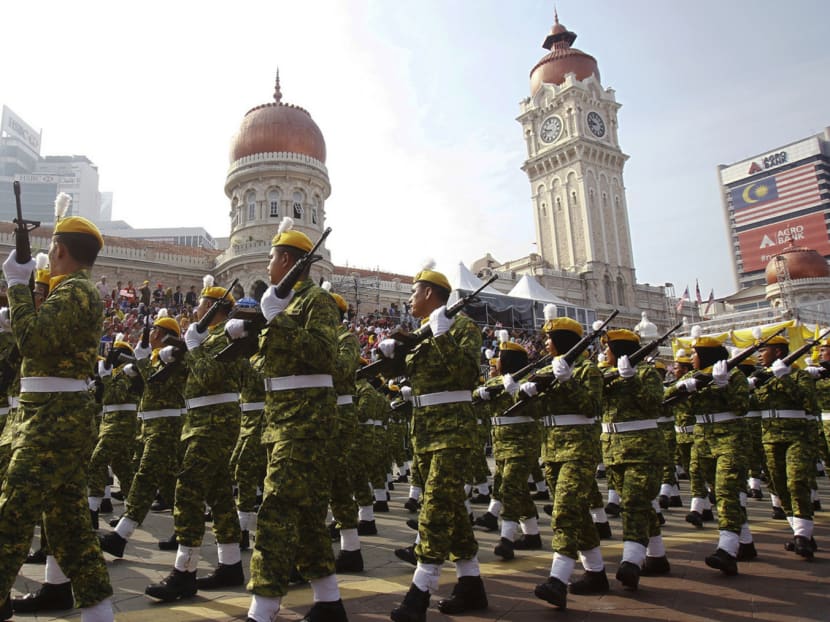A generation fixing Malaysia from the ground up
Malaysia’s Merdeka generation was focused on building a new nation. Paving roads, constructing schools and hospitals. Fighting communists. Rolling out five-year plans. Managing race relations.

Malaysian People’s Volunteer Corps personnel at the 60th National Day celebrations at Independence Square in Kuala Lumpur yesterday. Many Malaysians have been doing interesting things, providing examples of ingenuity, hope and renewal for their country. Photo: AP
Malaysia’s Merdeka generation was focused on building a new nation. Paving roads, constructing schools and hospitals. Fighting communists. Rolling out five-year plans. Managing race relations.
Their children — my generation — was all about chasing prosperity.
We came of age in the go-go Mahathir years. The stock market was hot, the property market hotter, and a horse-racing track made way for what was briefly the world’s tallest towers.
Many of my university mates stepped straight into jobs in stockbroking, finance, corporate law. (Then came the Asian financial crisis, but that is another story.)
And this generation? It is going to be about fixing the country — all those things that were sacrificed in the name of progress, or at the altar of politics, or simply because we were looking the other way.
Things like social equality, and human rights, a free press and a government that truly represents the people.
As we mark 60 years after Merdeka, it is easy to compare our progress with that of our southern sibling, from which we split more than half-a-century ago, and despair.
Once, we were trying to catch up to the Asian tigers — Singapore, Hong Kong, South Korea, Taiwan. Today, we are worrying about keeping our lead among the tiger cub gang of Indonesia, Thailand and the Philippines — while riding the dragon’s tail of an ascendant China. But you do not have to look too hard to find examples of ingenuity, hope and renewal.
While many of us wring our hands over the state of the nation, or emigrate, others are getting out there and doing interesting things. And it is happening from the ground up.
Some of this has to do with a broader global shift, with disruptions and freedoms brought by the Internet, the shattering of the traditional career ladder and the rise of the gig economy. But there is also a palpable yearning to make a difference.
We see Malaysians putting their careers on hold to teach in rural public schools and offering free tuition to those who need it, through groups such as Teach for Malaysia and Teach for the Needs. We see Malaysians starting enterprises, big and small, that are upending traditional models.
Remember something called MyTeksi a few years ago? It is now called Grab, and has expanded its ride-hailing app to six countries, giving Uber a run for its money, while making our commutes easier. We see Malaysians hitting the streets to make a stand on issues they care about. Witness the sea of yellow that washes over the city each time a Bersih rally for fair elections comes around. This would have been unthinkable in the 1980s and even up till the late 1990s, before the sacking of a deputy prime minister divided a nation.
We see young Malaysians writing and reading again.
The independent publishing scene is exploding, churning out hundreds of titles, mostly in Malay, and also in English. Buku Fixi has launched dozens of first-time writers, crowdsourcing them through social media, as has the rival Lejen Press (slogan: “I am Lejen”). This new writing is raw, and not always grammatical, nor always beautiful, but, as national laureate A Samad Said put it: “It’s sincere.”
We see a flowering of culture and the arts, again from the ground up, with or without grant money. Arts festivals are popping up in Georgetown, in Kuala Lumpur, in Iskandar, in Ipoh, even in Butterworth. Some weekends, it can be hard to decide which show or screening or public forum to attend.
These events do not just delight the senses, they also open minds and spark discussion. And they bring people of all generations together.
We see Malaysians stepping out of their social bubbles to help some of the most vulnerable living among us — offering schooling and support to refugees, feeding the homeless.
Last year, three Malaysian university students started the Picha Project, a catering service with food cooked by refugee families from Myanmar, Syria, Afghanistan and elsewhere, in order to — as they phrase it — put food on their table as they put food on yours. When one of the young co-founders spoke at her graduation this year, she used the platform to urge her pals to use their newly minted degrees to take care of the environment and society, and bring communities together.
Of course, for real change to happen, it has to move from grassroots to government, because that is where the real resources are. It is where our tax money is pooled and where those funds can be directed to the greatest good. For that to happen, all generations have to work together.
Is it really so hard to imagine a future where someone like Picha Project’s Suzanne Ling could be Minister of Social Enterprise? Or where Georgetown Festival’s Joe Sidek could be Minister of Culture, Arts and Heritage? How about Grab’s Anthony Tan as Minister of Transport? Buku Fixi’s Amir Muhammad as head of Dewan Bahasa dan Pustaka (Institue of Language and Library)? Why not? THE MALAYSIAN INSIGHT
ABOUT THE AUTHOR:
Chen May Yee is a Malaysian journalist and was until recently a part-time copy editor with TODAY.






